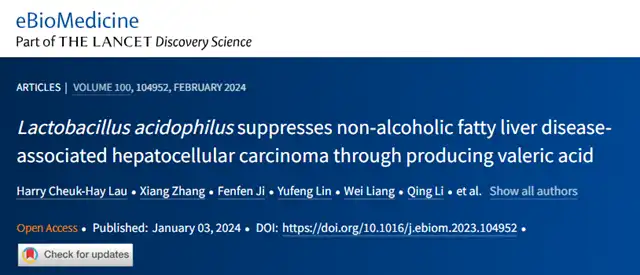Can Probiotic Lactobacillus Acidophilus inhibit liver cancer?
- Normal Liver Cells Found to Promote Cancer Metastasis to the Liver
- Nearly 80% Complete Remission: Breakthrough in ADC Anti-Tumor Treatment
- Vaccination Against Common Diseases May Prevent Dementia!
- New Alzheimer’s Disease (AD) Diagnosis and Staging Criteria
- Breakthrough in Alzheimer’s Disease: New Nasal Spray Halts Cognitive Decline by Targeting Toxic Protein
- Can the Tap Water at the Paris Olympics be Drunk Directly?
Can Probiotic Lactobacillus Acidophilus inhibit liver cancer?
- Should China be held legally responsible for the US’s $18 trillion COVID losses?
- CT Radiation Exposure Linked to Blood Cancer in Children and Adolescents
- FDA has mandated a top-level black box warning for all marketed CAR-T therapies
- Can people with high blood pressure eat peanuts?
- What is the difference between dopamine and dobutamine?
- How long can the patient live after heart stent surgery?
Can Probiotic Lactobacillus Acidophilus inhibit liver cancer?
Probiotic Lactobacillus Acidophilus Shown to Suppress Non-Alcoholic Fatty Liver Disease-Associated Hepatocellular Carcinoma.
The human gut microbiota, consisting of trillions of bacteria residing in the intestines, plays a crucial role in influencing metabolism, digestive capacity, infection resistance, drug response, and even cancer prevention. Non-alcoholic fatty liver disease (NAFLD) is the most prevalent chronic liver disease in China, affecting over 150 million individuals and often progressing to non-alcoholic steatohepatitis, cirrhosis, and liver cancer.
Lactobacillus acidophilus, a common lactic acid bacterium present in the human digestive tract, is considered a probiotic. Until now, it was unclear whether Lactobacillus acidophilus could contribute to preventing NAFLD-associated liver cancer.
On January 3, 2024, researchers from the Chinese University of Hong Kong published a study in the “eBioMedicine” journal, a sub-publication of “The Lancet,” titled “Lactobacillus acidophilus suppresses non-alcoholic fatty liver disease-associated hepatocellular carcinoma through producing valeric acid.”
The study revealed that supplementing with Lactobacillus acidophilus could inhibit NAFLD-associated liver cancer in mice. Metabolomic analysis identified valeric acid, a metabolite of Lactobacillus acidophilus, as responsible for the anti-cancer effect, validated in human and mouse cells. Additionally, valeric acid improved the integrity and function of the intestinal barrier.

Mechanistically, valeric acid binds to G protein-coupled receptors (GPCRs) on the surface of liver cells, deactivating carcinogenic signaling pathways and eliminating NAFLD-associated liver cancer.
In the study, researchers initially analyzed changes in the gut microbiota of NAFLD-associated liver cancer mice, finding a severe lack of Lactobacillus acidophilus compared to control mice.
Further, mice with liver cancer were fed Lactobacillus acidophilus or a control treatment for 28 weeks. Supplementation with Lactobacillus acidophilus significantly reduced tumor number, size, and burden compared to the control group. Histological assessments showed a significant decrease in fat degeneration and inflammation in non-tumor liver tissues of mice treated with Lactobacillus acidophilus, accompanied by significant reductions in liver damage markers ALT, AST, and cholesterol levels. Moreover, Lactobacillus acidophilus supplementation decreased the proportion of proliferating cells.
These findings suggest that Lactobacillus acidophilus exhibits anti-tumor effects against NAFLD-associated liver cancer.
The researchers further analyzed the impact of Lactobacillus acidophilus on the gut microbiota, revealing an increase in beneficial symbiotic bacteria and a decrease in potential pathogens.
In germ-free mice, Lactobacillus acidophilus treatment significantly reduced tumor number, size, and burden, as well as decreased fat degeneration and inflammation in non-tumor liver tissues. ALT, AST, and cholesterol levels were also significantly reduced.
This indicates that Lactobacillus acidophilus alone is sufficient to suppress liver cancer.
Finally, the researchers elucidated the anti-tumor mechanism of Lactobacillus acidophilus, attributing its effect to its metabolite, valeric acid, rather than the bacteria itself.
In vitro cell experiments demonstrated that valeric acid inhibited the viability of human and mouse liver cancer cells in a concentration-dependent manner but had no effect on normal liver cells.
Furthermore, valeric acid improved the integrity and function of the intestinal barrier in NAFLD-associated liver cancer mice.
Mechanistically, valeric acid binds to GPCRs on the surface of liver cells, deactivating carcinogenic signaling pathways and eliminating NAFLD-associated liver cancer.
The researchers noted that this study is the first to demonstrate the anti-tumor effects of Lactobacillus acidophilus on NAFLD-associated liver cancer in mice, suggesting the potential of probiotics in preventing liver cancer development.
In summary, supplementing with Lactobacillus acidophilus has been shown to inhibit the development of NAFLD-associated liver cancer in mice, reducing tumor growth, alleviating fat degeneration and inflammation in non-tumor liver tissues, and improving the integrity and function of the intestinal barrier. Further clinical research is needed to confirm its feasibility in mitigating the progression from NAFLD to liver cancer in humans.
Paper Link: https://doi.org/10.1016/j.ebiom.2023.104952
Can Probiotic Lactobacillus Acidophilus inhibit liver cancer?
(source:internet, reference only)
Disclaimer of medicaltrend.org
Important Note: The information provided is for informational purposes only and should not be considered as medical advice.



